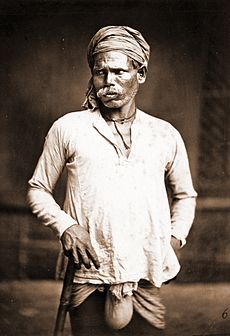Doma (caste)
[2] Historically, they were considered an untouchable caste called the Dalits and their traditional occupation was the disposal and cremation of dead bodies.
During the reign of the Chand dynasty and Gorkha, all service castes were referred to as Doma and were prohibited from wearing gold and silver ornaments.
Social activist Lala Lajpat Rai and dalit leader Khusi Ram sought to reject low caste status and introduced the term Shilpkar to replace the pejorative Doma.
They conducted purification rituals of Arya Samaj in which shilkars wore sacred threads (Janeu) and were allowed to use a palanquin in their wedding.
[2] Many nomadic and peripatetic groups in Uttar Pradesh are said to be of Doma origin such as the Bangali, Bhantu, Bazigar, Habura, Kanjar, and Sansi.
It could also be that the term Doma is generically used to describe any peripatetic nomad, as all of the aforementioned groups are distinct and strictly endogamous.
[14] Dom originally hails from the hilly tract of Visakhapatnam in Andhra Pradesh and they were known for their occupation as drummers and are often considered "untouchables" in the caste system due to their historical role in disposing of bodies, including both animal and human remains.
[9] The Central Bureau of Statistics of Nepal classifies the Dom as a subgroup within the broader social group of Madheshi Dalits.
The frequency of Doms was higher than national average (0.1%) in the following districts:[26] Saptari (0.3%), Dhanusha (0.2%), Mahottari (0.2%), Parsa (0.2%), Siraha (0.2%) and Sunsari (0.2%).
[citation needed] Dom are listed as Scheduled Caste for reservation in India (positive affirmative action in the government jobs) in Indian state of Uttar Pradesh, Bihar, Odisha and West Bengal.
